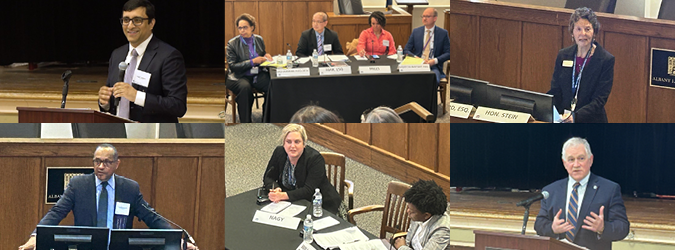By Prioritizing Our Humanity, We Prioritize Our Profession
12.23.2021
On the verge of a new legislative session, the New York State Bar Association is laser-focused on a set of legislative priorities that will advance our profession and help us better serve the public. The year ahead will no doubt be full of drama and gripping developments as the state chooses a governor, but NYSBA must keep the human impact of our legislative priorities in sharp focus.
When I think about our push for the state to provide representation to people in immigration and housing proceedings, I think of the personal stories I’ve heard from New Yorkers from various regions. Stories about how the services of a lawyer at the right moment would have kept their lives from being turned upside down. It’s easy to get caught up in the numbers. It’s easy to be blinded by the minutia, distracted by naysayers or lost in the politics. I encourage you to think of the human cost of not demanding change.
I think of Dalila Yeend, a Troy resident and single parent of two who unnecessarily spent two-and-a-half months in an ICE detention center in Batavia after being pulled over for rolling through a stop sign.
Born in Australia, Yeend was only 17 when she and her mother entered America. Soon, Yeend was building a family of her own. She escaped an abusive relationship and focused on raising her two children, one of whom has a developmental disability. Yeend’s attempts to secure a green card fell through several times, and she was eventually forced to check in with an ICE agent on a weekly basis, the specter of deportation hanging over her head.
After nearly three months in detention, she was told to gather her things. She thought she was being deported and wondered if she would ever see her children again. Then to her surprise, she was freed. Community members donated funds for Yeend to retain an attorney to help her secure a green card and her efforts were successful. Yeend has since become an advocate on immigration issues.
Her story is remarkable, but the trials she faced were unnecessary. A state-provided attorney could have aided her at any number of points, sparing her from financial hardship and the trauma of spending months in detention and preventing her children from experiencing the terror of their mother’s disappearance.
Similarly, there is no good reason for New York not to provide tenants in eviction cases with representation. Being forced out of a home has devastating consequences on families. It can cost jobs, uproot people from support systems, lead to severe mental health consequences and condemn families to a cycle of poverty. Eviction Lab, an organization dedicated to studying the human cost of eviction, states: “The evidence strongly indicates that eviction is not just a condition of poverty, it is a cause of it.”
For a better understanding of the human suffering access to a lawyer in eviction proceedings can prevent, I urge you to read “Evicted: Poverty and Profit in the American City” by Princeton sociologist and MacArthur “Genius” Matthew Desmond. Desmond spent a year following eight low-income families in Milwaukee as they struggled to pay rent, went through eviction and coped with the consequences.
“If incarceration had come to define the lives of men from impoverished black neighborhoods,” Desmond writes, “eviction was shaping the lives of women. Poor black men were locked up. Poor black women were locked out.”
Attorneys from all fields benefit from working to advance access to justice. Working directly with clients who need our help most keeps us connected to the purest essence of what it means to be a lawyer, to the good we can do.
It is not just our professional duty but part of our obligation as members of the human tribe. We must ensure that the most vulnerable among us aren’t forced to suffer dire consequences because no one was there to lend them a hand. No one should have their lives defined by an event that the services of a competent attorney can prevent.






